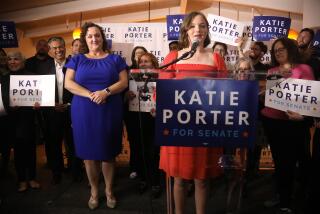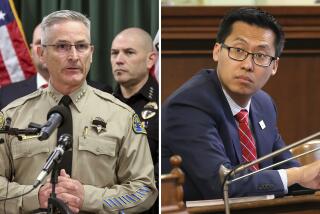ELECTIONS / 24TH CONGRESSIONAL DISTRICT : Beilenson Bets His Future in a New Arena
For years Rep. Anthony C. Beilenson has cast himself as a national legislator, largely free of parochial demands, a lawmaker who takes principled positions on tough issues even if doing so antagonizes some voters.
A critic of the federal budget deficits, he has long called for raising taxes. He would curb spending for potent constituencies including veterans and the elderly.
“He feels that if you tell the American people the truth, they’ll want to do the right thing,” said Rep. Christopher Shays (R-Conn.), who serves with Beilenson on the House Budget Committee. “Unlike a lot of other members, you know his position and he’s true to it.”
Beilenson says his constituents value his candor and an independence demonstrated by his refusal to take special-interest contributions.
He will soon find out if he is right. His 30-year political career is hanging in the balance in a new district.
Beilenson has always done his political high-wire act over a safety net of loyal Westside Democrats. They remained his base of support even when half his district became the more conservative West San Fernando Valley after the 1982 reapportionment.
The redistricting after the 1990 Census left him with a dilemma: oppose popular, well-financed Rep. Henry A. Waxman (D-Los Angeles) in a primary in a Democratic Westside district or take his chances in a Republican-leaning district that goes from Sherman Oaks to Agoura, extends up to Northridge in the West Valley and spills out to Malibu and over to Thousand Oaks in Ventura County.
Beilenson, 59, chose the latter--a partisan fight in the new 24th District. His opponent is conservative Assemblyman Tom McClintock (R-Thousand Oaks).
The tall, professorial Beilenson has won respect among colleagues as a thoughtful, fair-minded and dedicated lawmaker. A Harvard-educated attorney, he has been cited by Roll Call, the Capitol Hill newspaper, as one of the 20 smartest members of Congress and by U.S. News & World Report as one of the House’s 12 “straightest arrows” for his integrity.
Norman Ornstein, a political scientist at the American Enterprise Institute, calls Beilenson “a legislator of the top rank, a professional’s professional.”
At the same time, some Democrats privately criticize him for a certain aloofness--a reluctance to engage in the kind of political outreach and fund raising that can help elect like-minded colleagues or simply cover his own backside. “He was secure to a fault,” said a party consultant.
Beilenson’s voting record is to the left of center but defies easy labels. He advocates higher taxes but calls for spending restraint. He favors abortion rights and gun control but has voted for the death penalty and backs hard-line proposals to deter illegal immigration.
He is liberal on foreign policy. He opposed the Persian Gulf War, preferring sanctions. Shortly before the 100-hour ground offensive began, Beilenson was one of 45 lawmakers urging President Bush not to significantly increase the level of combat operations.
The liberal Americans for Democratic Action rated his 1991 voting record 80%; the American Civil Liberties Union, 85%; the AFL-CIO, 67%. The U. S. Chamber of Commerce gave him a 30% and the National Taxpayers Union, 35%, making him “average.”
The deficit has been Beilenson’s foremost issue. He opposed President Ronald Reagan’s 1981 tax cuts, which he says led to the sea of red ink. And in 1985 he unsuccessfully sought to persuade the Democratic caucus to back a plan to balance the budget within three years as an alternative to the Gramm-Rudman Act, which he termed unrealistic.
At one of his periodic town hall meetings at Tarzana Elementary School, Beilenson told about 150 residents that he voted against a balanced-budget amendment because it would merely provide cover for members to claim they had resolved the problem while actually buying them five or six years of delay till ratification.
Moreover, he said, eliminating the $334-billion deficit in just five years would require such extreme measures that “it would probably destroy the economy.”
He says the real key to fiscal constraint is stemming fast-growing health care costs, as exemplified by Medicare and Medicaid. He supports adoption of a national health-care plan, with the government paying the bills and setting prices for all services.
He is on record as supporting specific spending cuts including a reduction of 1.3 million active duty military personnel, canceling the space station and the B-2 bomber program and scaling back the Strategic Defense Initiative. He estimates that these cuts would save $90 billion over five years. Some would cost jobs in his district.
He has introduced bills to phase in a 50-cent-a-gallon increase in the gasoline tax over five years. He says it would raise $50 billion a year, encourage conservation and boost production of domestic fuels. Over time, he would also support a 5% consumption tax, excluding food, clothing and shelter, generating about $73 billion a year, and raise income taxes for those earning more than $200,000, raising $7 billion.
“I’m for doing any number of things if you can get the American people to agree that we’re in this sinking boat together and we’ve got to share the burden,” Beilenson said during a recent interview in his district office in Westwood.
To improve U. S. competitiveness, he advocates spending to upgrade education, rebuild infrastructure and retrain defense workers.
In the campaign’s first debate, McClintock cited a study by the National Taxpayers Union that showed that Beilenson had sponsored or co-sponsored bills in the current session that would cumulatively raise taxes $269 million, or $1,000 for every American.
Most of the increase is due to a single bill, the national health-care proposal. Beilenson contends that, despite a new federal payroll tax to fund it, this plan would lower health-care costs for all but the wealthy by eliminating private health insurance.
The lawmaker is an ardent environmentalist. He was one of 10 members of the House receiving a 100% voting rating from the League of Conservation Voters for 1991.
He sponsored the 1978 measure that created the Santa Monica Mountains National Recreation Area--a patchwork of park land and private holdings from Griffith Park to Point Mugu. He has been the leading congressional proponent, securing $129 million since 1980 for new properties.
An outdoorsman who has hiked in almost every national park, Beilenson has pursued these funds through his position on the Budget Committee as well as his personal ties to key colleagues--notably Rep. Sidney R. Yates (D-Ill.), who chairs the House Appropriations subcommittee on Interior.
He has also gained $13.5 million in recent years for a 160-acre park and a 60-acre wildlife refuge in the Sepulveda Basin. On a recent sun-drenched afternoon, Beilenson joined Los Angeles Mayor Tom Bradley, members of the City Council and others to celebrate the completion of a 27-acre lake in the Sepulveda Basin. As sailboats glided behind them, officials extolled the lawmaker’s role as essential in securing the federal funds to make the lake a reality.
Beilenson opposes expanded oil drilling off the California coast, voted for the sweeping Clean Air Act in 1990 and has made saving the endangered African elephant a personal cause.
He has staunchly supported abortion rights. As a state senator in 1967, he wrote the measure that greatly expanded legal abortion in California. He supports federal funding of abortions for poor women and opposes any restrictions, including parental notification or a 24-hour waiting period. He calls for increased worldwide family planning, including abortion.
“Whether we like it or not, enormous numbers of American women always have had abortions and always will,” Beilenson said. “And the only question--not only for American women but for women throughout the world--is whether we will deny them access to decent and adequate medical care or force them to have illegal abortions.”
Beilenson’s positions on crime issues are mixed. Abandoning his previous opposition to capital punishment, he has voted for it for convicted drug kingpins, those who kill law enforcement officers, spies and perpetrators of heinous crimes.
He advocates gun control, favoring a ban on 14 kinds of weapons and a seven-day wait to buy a handgun.
On the other hand, he opposes efforts to weaken the legal rule that bars the use in court of illegally obtained evidence.
Beilenson’s impact is most apparent through his work on three key committees.
He is the third-ranking Democrat on Rules, the panel of nine Democrats and four Republicans that determines the nature of debate--and often the fate--of each bill that reaches the House floor. Members serve at the pleasure of the House leaders of their parties, making this a preserve of the faithful.
Beilenson by all accounts is adroit and active. “Tony is a very deliberate member,” said Chairman Joe Moakley (D-Mass.) “He doesn’t always say things that people appreciate.”
A Republican member described Beilenson as one of the least partisan Democrats on a panel known to give members of the minority short shrift. “He’s the only one who even acts like it hurts a little bit. The rest of them stick the knife in, turn it, and say, ‘There, sucker.’ ”
Beilenson served as chairman of the House Permanent Select Committee on Intelligence in 1989-90. Here, too, he won praise from both sides of the aisle for even-handedness. He helped slash the intelligence budget--though specifics cannot be disclosed by law--and advocated reducing or eliminating covert aid in such places as Nicaragua, Angola and Afghanistan.
“He was fair and responsible and knowledgeable and articulate and compassionate,” said a Republican member who did not want to be quoted by name. Still, the lawmaker said he opposed the deep cuts Beilenson and other Democrats sought in covert aid.
On the Budget Committee, Beilenson is “a tremendous deficit hawk. His mind-set is incredibly dedicated to cutting the deficit and not recognizing any sacred cows,” including Social Security and Medicare, said a source familiar with the panel’s proceedings.
In meetings on the deficit, Republican Shays recalls Beilenson urging committee colleagues: “I want to find some answers here. This is crazy. We have only ourselves to blame.”
Shays added: “He might be willing to vote for new taxes, but he sure as hell isn’t going to continue bankrupting the country with new spending.”
Beilenson supports public financing of political campaigns and a ban on political action committee contributions. He is the only member of the California delegation who refuses to accept any money from PACs. He was one of few legislators who did not take any speaking fees from special interests before the House banned the practice in 1991.
He has prided himself on refusing to stockpile the kind of campaign fund that many incumbents use to dissuade serious opposition. Now, however, he has been forced to seek money aggressively for a $500,000 campaign, even as he introduces himself to new voters. The challenge seems to have energized him.
Some observers think that Beilenson has been underestimated politically because he’s rarely been pushed. He’s lost only one election, when he sought the Democratic nomination for the U. S. Senate in 1968.
Beilenson’s parents founded Peter Pauper Press of White Plains, N.Y., in 1928. When his mother died 11 years ago, her bequest made him financially comfortable after he and his wife, Dolores, had scraped for years to educate their three children. They have three grandchildren.
In addition to his permanent home in upscale Chevy Chase, Md., he owns a Westwood condominium. This spring he and his wife rented an apartment in Woodland Hills in the heart of the 24th District. The congressman said they plan to buy a home in the new district if he is elected.
During this term, Beilenson has taken an increased interest in local issues. He has pushed for funds for Metro Rail and for finding ways to retrain aerospace workers who have lost their jobs to defense cuts.
He says the shift is due to the impact of the recession rather than the reality of reapportionment. “There is an obvious need there which wasn’t there two or three years ago,” Beilenson said, alluding to his constituents. “Frequently, you can’t help but feel their troubles and understand the problems that they face. You do what you can back there to be of some help.”
Congressional District 24
Anthony C. Beilenson (D-Los Angeles) has represented parts of the Westside for nearly 30 years--first in Sacramento and, since 1977, in Congress. But he is running in a newly drawn district that includes Malibu, the west San Fernando Valley, several Ventura County communities--and none of his old Westside base. His Republican challenger, Assemblyman Tom McClintock of Thousand Oaks, defeated eight candidates in the June primary. Although the district has slightly more Democrats than Republicans, it is considered a swing district. John Paul Lindblad, Peace and Freedom candidate, also is in the race. *
Demographics Anglo: 78% Latino: 13% Black: 2% Asian: 6% *Party Registration Demo: 45% GOP: 44% Others: 11%
More to Read
Get the L.A. Times Politics newsletter
Deeply reported insights into legislation, politics and policy from Sacramento, Washington and beyond. In your inbox three times per week.
You may occasionally receive promotional content from the Los Angeles Times.






